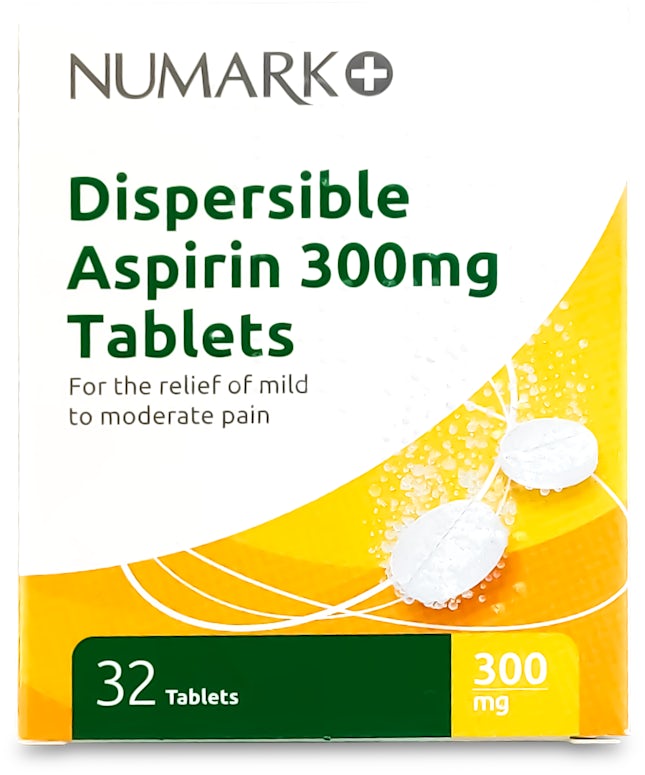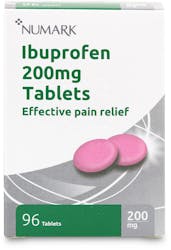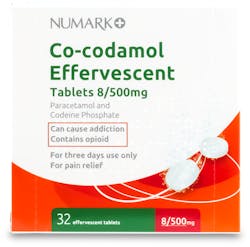Numark Dispersible Aspirin 300mg 32 Tablets
Numark Dispersible Aspirin 300mg 32 Tablets
What 500,000+ customers say about medino:
Get notified when back in stock
Description
Discover Numark Aspirin 300mg Dispersible Tablets, an effective remedy for a variety of discomforts. These tablets are particularly useful for individuals experiencing headaches, migraines, toothaches, and sore throats. They also offer relief from rheumatic pain, muscle strains, and fevers that accompany colds. Numark Aspirin stands out for its anti-inflammatory properties, making it a reliable choice for reducing pain and swelling. The quick-absorbing dispersible format ensures prompt relief, making it a must-have in any medicine cabinet.
Key features
- Effective against headaches, migraines, and toothaches
- Alleviates rheumatic and muscle pain
- Lowers fever and eases cold and flu symptoms
- Quick absorption due to dispersible format
- Each tablet contains 300mg of aspirin for effective relief
- Comes in a pack of 32 tablets for convenient symptom management
What symptoms or conditions can be treated with Numark Aspirin 300mg Dispersible Tablets?
Numark Aspirin 300mg Dispersible Tablets are effective for treating pain, swelling, and fevers. This includes headaches, migraines, neuralgia, toothache, sore throat, period pains, and rheumatic discomfort.
What are the benefits of using Numark Aspirin 300mg Dispersible Tablets?
Benefits include prompt pain relief, inflammation reduction, fever lowering, and easing various bodily aches. Its dispersible nature allows for swift absorption.
How does Numark Aspirin 300mg Dispersible Tablets work?
The active ingredient, aspirin, inhibits the body's production of chemicals that cause pain, inflammation, and fever.
What does the research say about Aspirin Tablets?
Aspirin is widely recognized for its analgesic, antipyretic, and anti-inflammatory properties.
Does Numark Aspirin 300mg Dispersible Tablets contain any common allergens?
These tablets contain lactose, which may be problematic for individuals with lactose intolerance.
Can Numark Aspirin 300mg Dispersible Tablets be used for cardiovascular benefits?
Under physician guidance, aspirin may be used to reduce the risk of heart attacks and strokes by thinning the blood.
Ingredients
Active ingredient: Aspirin 300mg
Usage and Instructions
Adults, the elderly and children over the age of 16 years:
Take 1 to 3 tablets with water, every 4 hours.
Do not take more than 4 doses in any 24 hours.
A lower dose is recommended for the elderly.
Do not exceed the stated dose.
If symptoms persist for more than 3 days consult your doctor.
Warnings
Do not give this medicine to children under the age of 16 unless your doctor tells you. This is because there is a possible association between Aspirin and Reye's Syndrome when given to children. Reye's syndrome is a very rare disease, which can be fatal.
Do not take Aspirin 300mg Tablets if you:
Are allergic to aspirin, NSAIDs (which includes those when in attacks of asthma, angioedema, urticaria or rhinitis have been precipitated by aspirin or any other NSAID) or any of the other ingredients.
Have a stomach ulcer or have had problems with ulcers in the past.
Suffer from haemophilia or any other bleeding condition
Suffer from gout or had in the past.
Are in the last 3 months of pregnancy or are breastfeeding.
Take special care and tell your doctor before taking Aspirin 300mg Tablets if you:
Are intolerant to some sugars as these tablets contain lactose.
Have asthma or have ever had it in the past.
Have dehydration.
Have been told you are deficient in glucose-6-phosphate dehydrogenase.
Are in the first 6 months of pregnancy.
Tell your doctor or pharmacist before taking Aspirin 300mg Tablets if you are already taking any of the following medicines, as their effectiveness may be influenced by aspirin if they are taken at the same time:
Metoclopramide (for sickness and digestive disorders).
Blood thinning medicines such as Heparin, Warfarin or nicoumalone.
Corticosteroids e.g. hydrocortisone (which can be used for arthritis, asthma and inflammatory conditions).
Anti-inflammatory medicines or steroids for pain and inflammation e.g. ibuprofen.
High blood pressure medicines e.g diuretic/water tablets, Angio-II receptor antagonists or ACE inhibitors.
Epilepsy medicines e.g. Phenytoin, Sodium valproate.
Methotrexate (for psoriasis, arthritis or tumours).
Antacids for indigestion.
Probenecid or sulphinpyrazone for gout.
Anti-depressants e.g. citalopram.
Side Effects
Probably the most well known side effect of aspirin is that it has the potential to cause serious side effects like ulcers or bleeding in the stomach or intestines. These problems are more likely in elderly people and those who've had peptic ulcers in the past. The risk can also be increased by taking certain other medicines.
Other possible aspirin side effects include:
- Increased time taken to stop bleeding or other bleeding problems (see below).
- Sensation of ringing, or other noise in the ears (tinnitus).
- Confusion.
- Allergic reactions such as skin rash, swelling of the lips, tongue and throat (angioedema) or narrowing of the airways (bronchospasm or asthma attack - see below).
Tell your doctor about any side effect that is troubling you. However, it's particularly important that you do this without delay if you experience any of the following:
- Any breathing difficulties or wheezing, or swelling of the face, throat or tongue.
- Any sign of bleeding in your stomach or intestine, for example vomiting blood and/or passing black/tarry/bloodstained stools.
- Any other unusual bleeding, for example nosebleeds, purple spots or bruising under your skin, blood in your urine or coughing up blood.
- Severe skin reactions, such as a widespread itchy rash, blistering or peeling of your skin.







